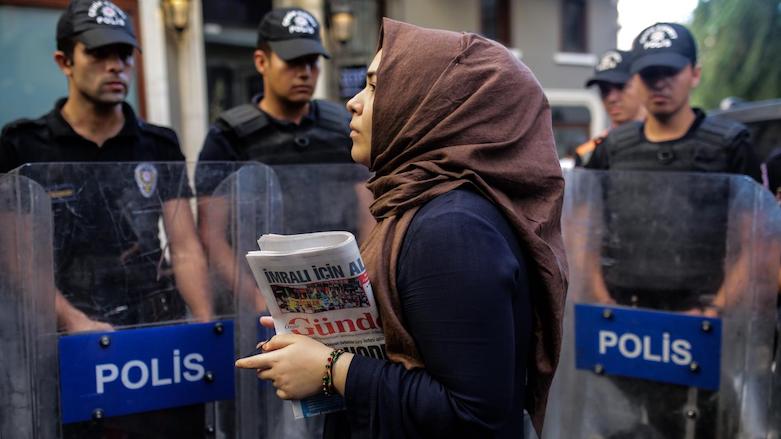Turkey to jail five journalists for editing shuttered pro-Kurdish daily

ERBIL, Kurdistan Region (Kurdistan 24) – A Turkish court in Istanbul on Tuesday sentenced five veteran journalists to prison sentences ranging from 18 to 45 months for symbolically becoming editor-in-chief of the now-closed pro-Kurdish newspaper Ozgur Gundem.
Journalists Ragip Duran, Ayse Duzkan, Huseyin Bektas, and Mehmet Ali Celebi received one-and-a-half-years of imprisonment while Huseyin Akyol was handed three years and nine months over what judges deemed as propaganda for “a terror group.”
Duran called the ruling “farcical” and vowed to continue to exercise his profession.
The sentencing of more media members came the same day the US-based watchdog Freedom House downgraded Turkey’s status in protecting political and civil liberties from a “Partly Free” country to a “Not Free” one.
Ozgur Gundem, published since 1992 in the Turkish language, was ordered to shut down by an Istanbul penal court in August 2016, a month after the attempted military coup to topple President Recep Tayyip Erdogan’s administration.
“The Ankara government arrested journalists, shuttered media outlets, closed at least 1,500 civil society organizations, removed elected Kurdish mayors, seized businesses, and put more restrictions on the use of the Internet and freedom of expression,” the Freedom House report said about incidents in Turkey last year.
According to a December 2017 report by the Committee to Protect Journalists (CPJ), Turkey is the country with the highest number of reporters jailed at 73.
The Turkish Journalists’ Association put the number at 160, a significant portion of them Kurdish.
Meanwhile, another court continued to resist an order by a Constitutional Court last week to release two columnists, Mehmet Altan and Sahin Alpay, jailed for more than a year over charges of attempting to overthrow the government and supporting “terrorist groups.”
The court’s refusal to abide is a first since the foundation of the country’s highest court five decades ago whose rulings bind the judicial, legislative, and executive branches.
Editing by Karzan Sulaivany
